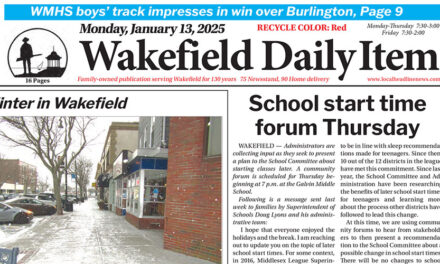By DAN TOMASELLO
LYNNFIELD — Over 100 properties in town contain racial covenants in deeds.
The North Shore NAACP and Harborlight Homes, a Beverly-based affordable housing nonprofit organization, recently undertook the “Dirty Deeds Project.” The initiative revealed that hundreds of deeds across the North Shore contain racist covenants included as part of deeds that sought to prohibit people of color and other ethnic groups from living in those properties.
Harborlight Homes Advocacy and Education Manager Jean Fana informed the Villager that 122 properties in Lynnfield have “racial covenants in their paper trail.”
“Lynnfield had the most of any North Shore community by any measure,” said Fana. “The language on all of them for Lynnfield either say, ‘not be conveyed to person not of Caucasian race’ or ‘no persons other than Caucasian race shall use.’ They are not legally enforceable.”
In addition to the 122 Lynnfield properties that have racial covenants, Fana said there are 81 properties in Danvers, 51 in Nahant and 37 in Saugus that contain similar language.
The U.S. Supreme Court ruled in 1948’s Shelley v. Kraemer case that restrictive racial covenants in real property deeds were unconstitutional because they violated the 14th Amendment’s equal protection provision. The Fair Housing Act of 1968 prohibited discrimination concerning the sale, rental and financing of housing based on race, religion, national origin, sex, disability and family status.
Fana said Harborlight Homes and the North Shore NAACP undertook the “Dirty Deeds Project” by partnering with the University of Minnesota’s Libraries’ “Mapping Prejudice Project.”
“The University of Minnesota opened it up to anybody who wanted to conduct similar research in their region and offered to help,” said Fana. “We accepted, and they used their algorithm to scan documents. The problem with researching property records for any purpose is records in New England can be up to 400-years-old. A lot of them are not digitized and a lot of them are not categorized in any way. This algorithm can scan the documents that are digitized. We used the University of Minnesota’s database to find these racial covenants.”
Fana said Harborlight Homes will be sending a mailer to the 122 property owners whose homes have racially-restricted covenants in mid-November.
“We are going to be mailing a number of individuals in Lynnfield to let them know,” said Fana.
Fana said the “Dirty Deeds Project” was important to undertake because the covenants are part of North Shore history.
“We have a little bit of a mythology in Massachusetts generally and also on the North Shore that racism is a problem in other places, and Massachusetts is a liberal utopia that doesn’t have that problem,” said Fana. “What we are trying to outline is that is not the case. These covenants are still on the books. One of the things that we were able to correlate is a lot of these racial covenants are in residential single-family housing districts. We know that is, in effect, economic segregation. You have to get to a certain level of income before you can even think about buying into that kind of a neighborhood. Even though the methods have changed, the motivations are still there. We want to highlight those and draw attention to them.”
While Fana said the racially restricted covenants are illegal, he said it’s important for Lynnfield and other North Shore communities to learn about them and confront them.
“Barry Bonds still has homerun records under his name, but we put an asterisk on them because he took performance enhancing drugs,” said Fana. “It’s similar to that. These are still in the records. We are not getting rid of history. These are still preserved and are still in the records, but we are putting an asterisk on them. We are saying that is not the society we live in today.
“What people often hear in today’s day in age is people are concerned about the character of their community and the changing character of their community,” Fana continued. “Character is the word that typically gets used today when people talk about development and community changes. People often use euphemistic language to save themselves from having to confront what is in front of us. It’s important to recognize that this is both history and present. The ultimate goal is to think about what is happening today.”
School Committeeman Phil McQueen commended Fana’s work on the “Dirty Deeds Project.” He taught Fana at Lynn Classical High School.
“I am proud and humbled by my former student Jean Fana’s work and activism in this area,” said McQueen. “As shocking as this information is locally, unfortunately, it is not surprising as racist redline zoning laws are part of the systemic racism that has prevented minorities from becoming property owners. We, as a community, need to learn about this racist stain on the country’s and town’s history so we can ensure this becomes public knowledge and does not happen again.”
After George Floyd was murdered by a Minneapolis police officer in May 2020, the Planning Board approved a resolution condemning past discrimination, particularly when it involved zoning, during a June 2020 meeting.
“It is imperative that government entities at every level point out evidence of racial discrimination and policies that have contributed to racial inequality in their communities whether those policies were enacted with an intent to discriminate or not,” the Planning Board’s resolution stated. “In our country’s and in our community’s past, systemic policies, covert and overt, have led to discrimination against Black Americans and other people of color. Discrimination is not just an insult to our most basic notions of fairness, it causes a significant loss, as families and individuals facing discrimination are unable to make the best use of their diverse talents and this hurts us all.
“We are a better country when everyone is empowered to meet his or her full potential, and discrimination based on race is contrary to the values we promote in Lynnfield,” the Planning Board’s resolution continued. “Specific historical planning and zoning practices, like an overt race ban, in a homeowners’ association document and implementation of exclusionary zoning based on minimum lot sizes were discriminatory and had negative effects.”
The Planning Board’s resolution concluded by stating, “Going forward, we recommit ourselves to acting upon our values of caring, mutual respect and unity, and making the town of Lynnfield a welcoming place for all.”




